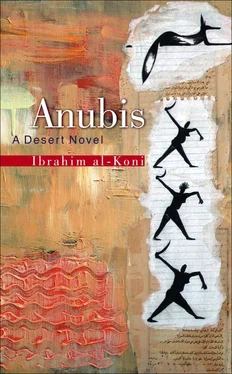I felt that I would put an end to the disruptions, longings, and hunger, if I created a single structure from the two. How could I combine them?
I thought long and hard, and voyaged far and wide in my dreams. When I finished this spiritual investigation, I climbed the mountain and set to work.
I used the noble statue in the foundation and wall for my new dwelling, and it became the house’s cornerstone. Wishing to manifest the dream vision through this structure, I told myself that the house could not be a cozy nest unless through its circularity it resembled the sky, the moon, the lord of light Ragh, and the horizon, which arches to encompass the earth. Thus I constructed circular walls like those of the sepulchers of the ancestors. When I finished the walls, I fetched branches, fronds, palm fiber, and palm leaves from my nest below the mountain and wove them over these walls to fashion for this dwelling a domed roof — inspired by the shape of the sky — as an echo of the sky’s exaltation.
Once I fulfilled the prophecy, I felt satisfied. Once I felt satisfied, my heart was flooded by ecstasy, longing, and intoxication. So I sang. I sang a touching song of praise for my glorious edifice, to which kinsmen would later bow in prayer, designating it a temple.
Then I reflected on all the works of my hands and on all the toil I had exerted in my labor. In truth, all was vanity and a grasping at the wind, for there is nothing to be gained under the sun.
Ecclesiastes 2: 11

I STRUGGLED ALL MY LIFE to reach my eternal father in the higher world, but my father would only consent to appoint me his deputy in the lower world. I wrestled all my days to reach him in the heavens, but he chose to appoint me sovereign of a dirt-covered foothill over which roam the shades that burden the earth.
In later times, caravans stormed me. I did not know whether they were commanded by jinn from the spirit world or by the spawn of men. I asked them repeatedly what they really were, but every time they replied, in a tone suggesting veiled condescension, “The fact is that we are none but you.” I also interrogated the nobles about the circumstances that had cast them into my home-place, which was protected by the desert’s wiles. They would smile furtively and respond that cunning prophets had guided them. If I chanced to ask their destination, they would answer ungrammatically, “From where we come, to there returning we go.” Some were mirthful and others painfully stern, but I saw their uniform enthusiasm for late parties at which people sang. They enjoyed spending their evenings with me while recuperating from the terrors of the route and would converse with each other in their pidgin tongue as if exchanging verses of poetry. Occasionally they sang sad laments or launched into long conversations about riddles like hope, heroism, and happiness. At times they continued their chatter till dawn. Before they set off again, they would leave me various types of meat and tools, along with other gifts, in exchange for the water. One of them happened to leave me a present that was responsible for robbing me of my peace of mind and turning the oasis upside down. The gift was some vile dust that danced in the rays of light. The man said it was called gold dust. The leader of the caravan told me that this dust could be exchanged for commodities but could also harm people, change enemies into bosom buddies, buy protection, bolster civilization and destroy cities, transform the lowest to the highest and the highest to the lowest, subjugate the spirit, enslave other people, overcome any redoubt, and work any miracle. He finished by saying that it was a rebellious demon, notwithstanding its gaiety, and could turn into an evil thing, unless its owner handled it wisely. I thirstily imbibed his account. I did not, however, have occasion to use the dust until much later — when the seduction of taxation distracted me from the truth about it — for I bartered my water for the various types of commodities that leaders had devised throughout the desert: food, clothing, livestock, and even other human beings.
Yes, water brought me slaves, vassals, and women of the type known as slave girls. I would cleave to their bodies when I felt a need for warmth, for I discovered by fondling them that their companionship served as an antidote for loneliness. I also modeled on their conceits some amulets that were useful as a balm to heal the body’s ills, even though the conduct of these women and the fluctuation of their humors often agitated me to such a degree that I was reminded of my first she-jinni. I could, now that I was migrating between the embraces of women I owned, diagnose her as having been afflicted by what the sages of migratory tribes call “melancholy.”
The symptoms of this disease I found in the behavior of another seductively beautiful female jinni who arrived at the oasis with a prodigious cortège. She enchanted me with her voice, and I fell in love with her. It seems the gift of song was the secret snare by which this new she-jinni captivated me, not her beauty, since the voice, in its true nature, is profound, whereas beauty by itself, as experience has taught me, is a shell. I am now willing to acknowledge myself a coward, for my attempts to free myself from her were not inspired by her eccentricities but by my fear of loving her. I had cohabited with solitude for such a long time that solitude had become my true love and I was afraid of cheating on her with another playmate. Despite my secret conviction that this was the case, even so, I tried to outwit my certainty and to convince myself that my rejection of the beautiful woman’s passionate love was caused by my eagerness for calm and peace of mind. I used this contrived lie with the questioning men who crowded round me the day I ordered her expelled from the oasis. They obeyed, expelling her one morning as I had commanded, but I was flabbergasted when everyone in the oasis trailed after her. I could not believe it. At first I suspected that the throngs had followed merely to satisfy their curiosity or that they had turned out to bid her farewell as they did for important people. What really affected me, however, was their songs, which were genuine, heart-rending laments. So I dashed after them only to discover that the cause of the tumult was the beautiful woman’s singing. Yes, the she-jinni was raising her voice in a sorrowful song that affected me so deeply I was unable to walk. I halted halfway to them, weeping. My suppressed longing was roused, and I wept some more. Then I stopped my ears with my index fingers to stifle the sound so I could walk again.
With the sound stilled and the impediment of my feet lifted, I set off at a gallop. I rushed up to the weeping throngs. I caught sight of the vassals, who were clustered around her, lamenting and crying. I yelled as loudly as I could, “Bring her back! Bring her back! Bring her back!”
They brought her back, but I did not return. I obtained the lady of song for my home and as part of the exchange lost the lord of stillness. I kept to myself while I pondered my confusion. I did not conclude this self-examination until the spirit world whispered to me another truth, saying that a man passionately in love with solitude will never feel at peace with those passionately in love with women. I discounted this insight and surrendered to her, hoping to be able to forget. She attempted to compound from her embraces an antidote for my malady. She sang sorrowful songs to me in our bedchamber until I swooned. She did everything she could to grant me happiness, an enigma as mysterious as the desert. How preposterous! I perceived that happiness is a talisman that rightfully belongs to others, to people whose knowledge, pursuits, and travels are limited. Devotees of solitude are destined to take solace in silence, because their mission is to keep company with the spirit world. My heart was flooded by longing. I felt stifled and fled to the caves of the ancestors in the southern peaks. There I examined the wisdom that the first peoples had etched on the cavern walls. I argued at length with the spirit world and did not return from my fugue until I had received prophetic guidance. I entered the oasis one night and sequestered myself with the wisest and most trustworthy of my vassals to share the substance of this revelation with him. I could see disapproval in his eyes, but he obeyed. He undertook to bring me what I needed the following day: a leather bag of a depressing color, filled with an even more depressing powder. I hid this in my pocket and waited until the servants brought the food. Then I tossed all the powder into the broth. The she-jinni came, consumed the broth, and then ate. She sang until midnight, even though she had put enough poison into her belly to annihilate an entire caravan.
Читать дальше













